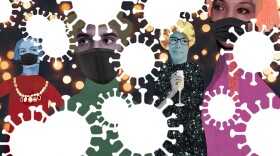
Maria Godoy
Maria Godoy is a senior science and health editor and correspondent with NPR News. Her reporting can be heard across NPR's news shows and podcasts. She is also one of the hosts of NPR's Life Kit.
Previously, Godoy hosted NPR's food vertical, The Salt, where she covered the food beat with a wide lens — investigating everything from the health effects of caffeine to the environmental and cultural impact of what we eat.
Under Godoy's leadership, The Salt was recognized as Publication of the Year in 2018 by the James Beard Foundation. With her colleagues on the food team, Godoy won the 2012 James Beard Award for best food blog. The Salt was also awarded first place in the blog category from the Association of Food Journalists in 2013, and it won a Gracie Award for Outstanding Blog from the Alliance for Women in Media Foundation in 2013.
Previously, Godoy oversaw political, national, and business coverage for NPR.org. Her work as part of NPR's reporting teams has been recognized with several awards, including two prestigious Alfred I. DuPont-Columbia University Silver Batons: one for coverage of the role of race in the 2008 presidential election, and another for a series about the sexual abuse of Native American women. The latter series was also awarded the Columbia Journalism School's Dart Award for excellence in reporting on trauma, and a Gracie Award.
In 2010, Godoy and her colleagues were awarded a Gracie Award for their work on a series exploring the science of spirituality. She was also part of a team that won the 2007 Nancy Dickerson Whitehead Award for Excellence in Reporting on Drug and Alcohol Issues.
Godoy was a 2008 Ethics fellow at the Poynter Institute. She joined NPR in 2003 as a digital news editor.
Born in Guatemala, Godoy now lives in the suburbs of Washington, DC, with her husband and two kids. She's a sucker for puns (and has won a couple of awards for her punning headlines).
-
Recent research and anecdotes suggest some people are testing negative on rapid tests even after they have symptoms, then later testing positive. Here's what researchers think is going on.
-
Making exercise a daily habit can feel daunting if it feels like it counts only when you go all in. Instead, remember that every small movement counts.
-
If you don't feel like waiting to score a free N95 mask from the federal government, here's what to know about how to buy a good one — and avoid the fakes. Plus, tips on how to fit them and wear them.
-
Trying to eat less meat? Make sure your meat-free meals are just as satisfying by seasoning your vegetables with the same spices you use to cook meat. It will carry some of that flavor over.
-
To block a variant this transmissible, scientists say you need an N95 or other high-filtration mask. Here's how to find a good one and when to wear it.
-
The charity Partners in Health aims to improve health services in lower income places like Haiti and Rwanda. Now it's setting up a permanent presence in the U.S. with an $11 million federal grant.
-
You might want to cancel that holiday party, and definitely dust off your face mask. Don't panic, but do step up your precautions. Here's how.
-
Cooking your bird to a safe 165 F often just results in a dry, boring plate of meat. Luckily, food scientists have studied this problem. Learn their techniques to roast your tastiest bird yet.
-
Research shows increasingly that layering one strategy on top of another can help minimize the spread of the coronavirus in classrooms.
-
This year, face masks are on most parents' list of back-to-school supplies. But which ones are most effective? Here's how to choose the right one for your child.









